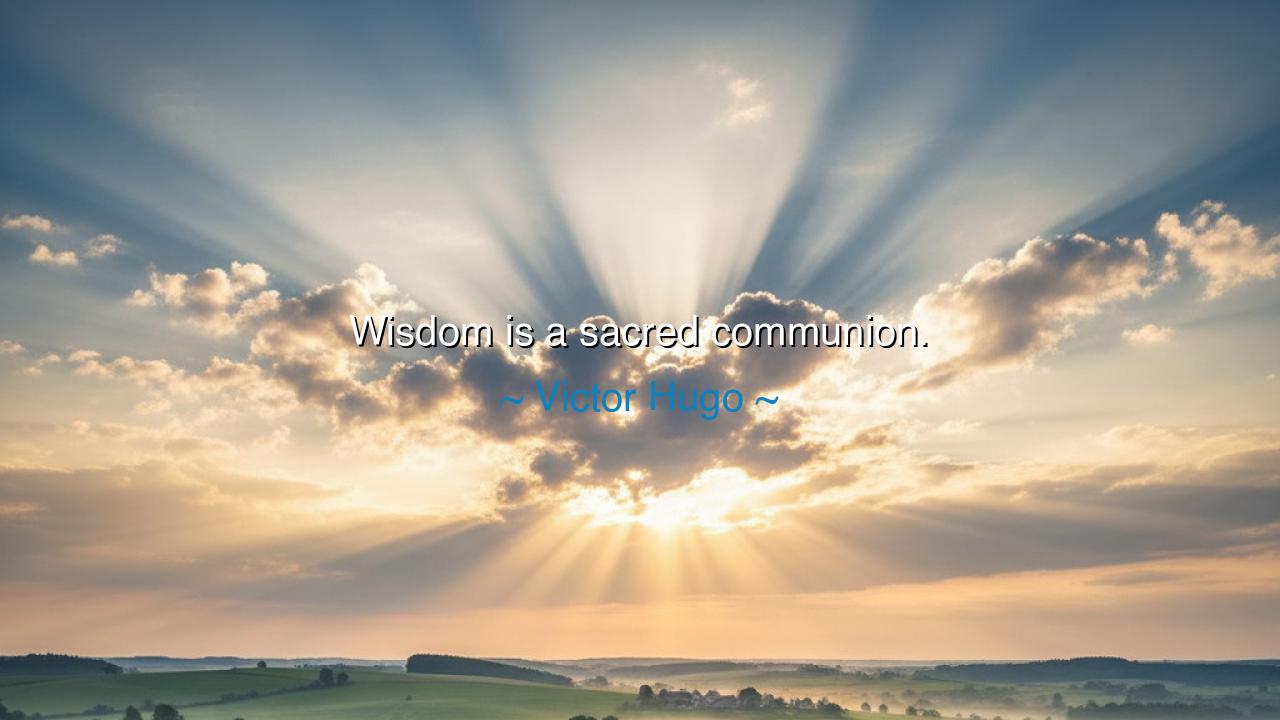
Wisdom is a sacred communion.






Victor Hugo, the great voice of France and champion of the human spirit, once declared: “Wisdom is a sacred communion.” These words are as deep as the oceans and as vast as the heavens. In them lies the truth that wisdom is not a mere collection of facts or clever thoughts, but a living bond between the soul and the eternal mysteries of life. It is sacred, for it touches the divine; it is communion, for it unites the seeker with truth, with others, and with the infinite order of the universe.
To call wisdom a sacred communion is to understand that it cannot be achieved through isolation or arrogance. The wise one listens—to the voices of ancestors, to the lessons of history, to the silent teachings of nature. Like a great river fed by countless streams, wisdom is nourished by connection. When we partake in this sacred exchange, we join with generations past and generations yet to come, becoming part of a timeless circle of understanding and reverence.
History offers us a shining example in the life of Socrates, the ancient philosopher of Athens. Socrates did not claim to hold all truth. Instead, through dialogue with his fellow citizens, he sought to awaken the spark of insight within them. His gatherings were a communion, where ideas were shared openly, and collective pursuit of truth was honored above individual pride. Though condemned by his city, Socrates’s teachings endure because they were rooted in the sacred act of seeking wisdom together.
Even great leaders have understood this principle. Abraham Lincoln, during the American Civil War, often retreated into quiet reflection, reading the words of ancient texts and listening to diverse counsel. He saw himself not as a solitary ruler but as part of a greater story of humanity. His wisdom came not from his own mind alone but from a communion with the past, the people he served, and the moral laws that transcend all earthly power. It was this connection that gave him the strength to guide a nation through its darkest hour.
Let this teaching be passed to future generations: wisdom is never owned, never hoarded, never selfishly claimed. It flows like a sacred current between hearts and minds, binding us to one another and to the mysteries of the cosmos. To seek wisdom is to enter into communion with all that is greater than the self, to humbly take part in the eternal conversation between humanity and the divine. And in that communion, life itself becomes holy, and the seeker finds a peace that no crown, no wealth, no fleeting power can ever provide.






Tthu
I love the sense of unity in this idea. It suggests that wisdom isn’t an individual possession but a bond—a meeting point of souls, ideas, or even eras. When people truly share insight or understanding, it feels sacred, just as Hugo describes. But I wonder, does that mean solitude can’t lead to wisdom? Or is solitude simply the preparation for communion—the moment of silence before mutual awakening?
TLTra Le
This quote moves me because it elevates wisdom beyond intellect—it’s something holy, shared, and transformative. I interpret it as saying that wisdom bridges the human and the spiritual. But I’m curious: does this communion require faith, or can it exist in purely human empathy and awareness? Maybe Hugo was pointing to the moral responsibility that comes with understanding—to use knowledge not for power, but for connection.
NANguyet Nguyen Anh
There’s a quiet reverence in this line that I really admire. It treats wisdom almost like a sacred ceremony rather than a mental achievement. I wonder if Hugo meant that wisdom connects us to the divine aspects of life—love, truth, compassion. It also makes me think about how rare that kind of understanding is today, when knowledge is everywhere but depth is scarce. Is wisdom still sacred in a digital world?
MK7A3_18_ Ho Hai Minh Khue
I find this statement deeply poetic. It implies that wisdom isn’t owned, but participated in. That makes me think about humility—how true insight often comes from listening, not asserting. But if wisdom is a communion, who or what are we communing with? Others? The universe? Our inner self? It suggests that understanding is relational, not solitary, and that to be wise is to be in harmony with existence itself.
VBNgo Van Binh
This quote feels almost spiritual, as if Hugo is suggesting that wisdom isn’t just knowledge but a shared experience between the self and something greater—perhaps truth, humanity, or even divinity. It makes me wonder, can wisdom truly exist in isolation? Maybe real understanding requires connection—with others, with nature, with conscience. I’d love to explore what he meant by ‘communion’—is it mystical, moral, or purely philosophical?